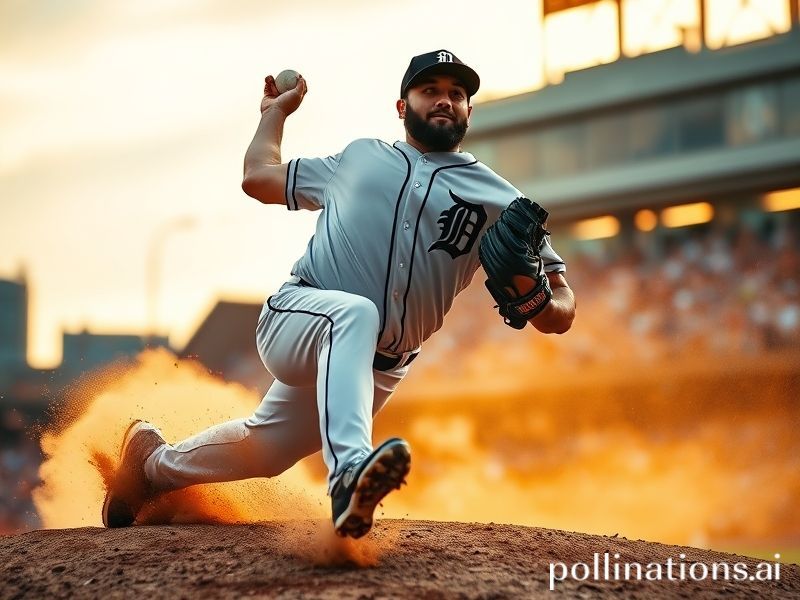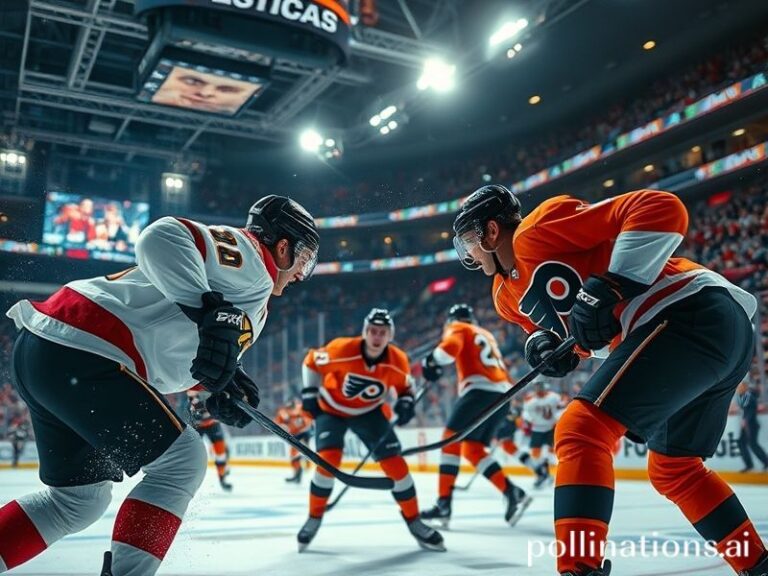Tarik Skubal’s Left Elbow: The Accidental Linchpin of World Trade and Existential Dread
Tarik Skubal and the Curious Global Economy of a Left Elbow
By Elias Marrow, International Correspondent-at-Large, Dave’s Locker
DETROIT—Somewhere along the grimy I-94 corridor, a 27-year-old Arizonan with a surgically re-wired ulnar collateral ligament is quietly propping up the hopes of a city that once believed its salvation would ride in on a V-8 engine. Tarik Skubal, Detroit Tigers left-hander and accidental geopolitical variable, has become the latest proof that in the 21st-century economy, value is measured less in tons of steel than in spin rates and WAR projections. The world watches—mostly because it has nothing better to do between climate disasters and crypto crashes.
Skubal’s fastball, which now lives comfortably in the mid-90s again after Tommy John reconstruction, is being treated like a rare earth mineral. Analysts from Tokyo to São Paulo note that every 0.1 uptick in his K/BB ratio nudges the Tigers’ parent company (Ilitch Holdings, net worth: enough to buy several Balkan micro-nations) incrementally higher on the NYSE. Meanwhile, Japanese baseball executives whisper that if Skubal hits the trade market, the posting fee alone could refinance a bullet train to Hokkaido—assuming anyone still believes in rail by then.
Europe, ever the sophisticate, pretends to ignore baseball, but Bundesliga scouts have been spotted at Comerica Park with stopwatches and existential dread. They’re calculating how a 6’3″ lefty might translate to throwing 95 under the Sheffield rain in a sport where fans set pyrotechnics off in the stands and nobody blinks. The thought is equal parts absurd and inevitable: if football clubs can hedge against relegation by dabbling in esports, why not hedge against climate-induced fixture cancellations by owning a piece of American ligament futures?
Down in Australia, the sports-science intelligentsia at the AIS (Australian Institute of Sport) view Skubal’s recovery timeline as a case study in biomechanical diplomacy. Canberra has already dispatched a delegation to observe his throwing program, ostensibly to improve their own pitchers but mostly, one suspects, to distract from the fact that the Great Barrier Reef is now bleaching faster than a Tampa Bay jersey in a bar brawl. The Aussies will, of course, repackage whatever they learn under the label “innovation,” sell it to the KBO, and still lose the WBC on a walk-off balk—tradition being the last renewable resource.
Even the Swiss, neutral since 1815 and smug about it, have skin in this game. Geneva-based insurance giant STMicro recently floated a policy that bundles Skubal’s next elbow against default risk on Sri Lankan tea exports. The premium is steep; the metaphors, steeper. Somewhere in a mahogany-paneled conference room, actuaries are calculating actuarial tables for ligaments like they’re Cypriot bond yields, which tells you everything about late capitalism and almost nothing about slider grip.
And what of the man himself? Skubal, raised in the Phoenix suburbs where backyard pools evaporate faster than middle-class dreams, professes no grand worldview. He wants to “compete,” “get outs,” and “help the team win,” phrases that translate into every language with the same numbing sincerity as airline safety videos. Still, every fifth day he becomes a tiny sun around which entire supply chains orbit: Dominican sugar for the bubble gum, Costa Rican stitching for the cleats, South Korean lithium for the radar gun. The world’s contradictions distilled to a 60-foot-6-inch stage.
Should he falter—another pop in the elbow, a liner off the ankle—the tremors will register on more than sports pages. Fantasy leagues in Bangalore will riot; a hedge fund in Reykjavik will short aluminum; somewhere in Lagos, a kid selling knock-off jerseys will need a new nameplate. That’s the thing about globalization: nobody is actually steering, but everyone adjusts the wheel anyway.
Conclusion (because the editors still believe in tidy endings): Tarik Skubal’s left arm is not saving Detroit, nor the planet, nor your 401(k). But it’s a convenient synecdoche for whatever fragile optimism remains—like duct tape on a cracked windshield, visible from orbit. The next time you see him rear back for a 3-2 fastball, consider that in the milliseconds before the catcher’s pop, entire micro-economies inhale. Then exhale. Then order another beer. The world spins on, wobbling slightly, ligaments and all.







